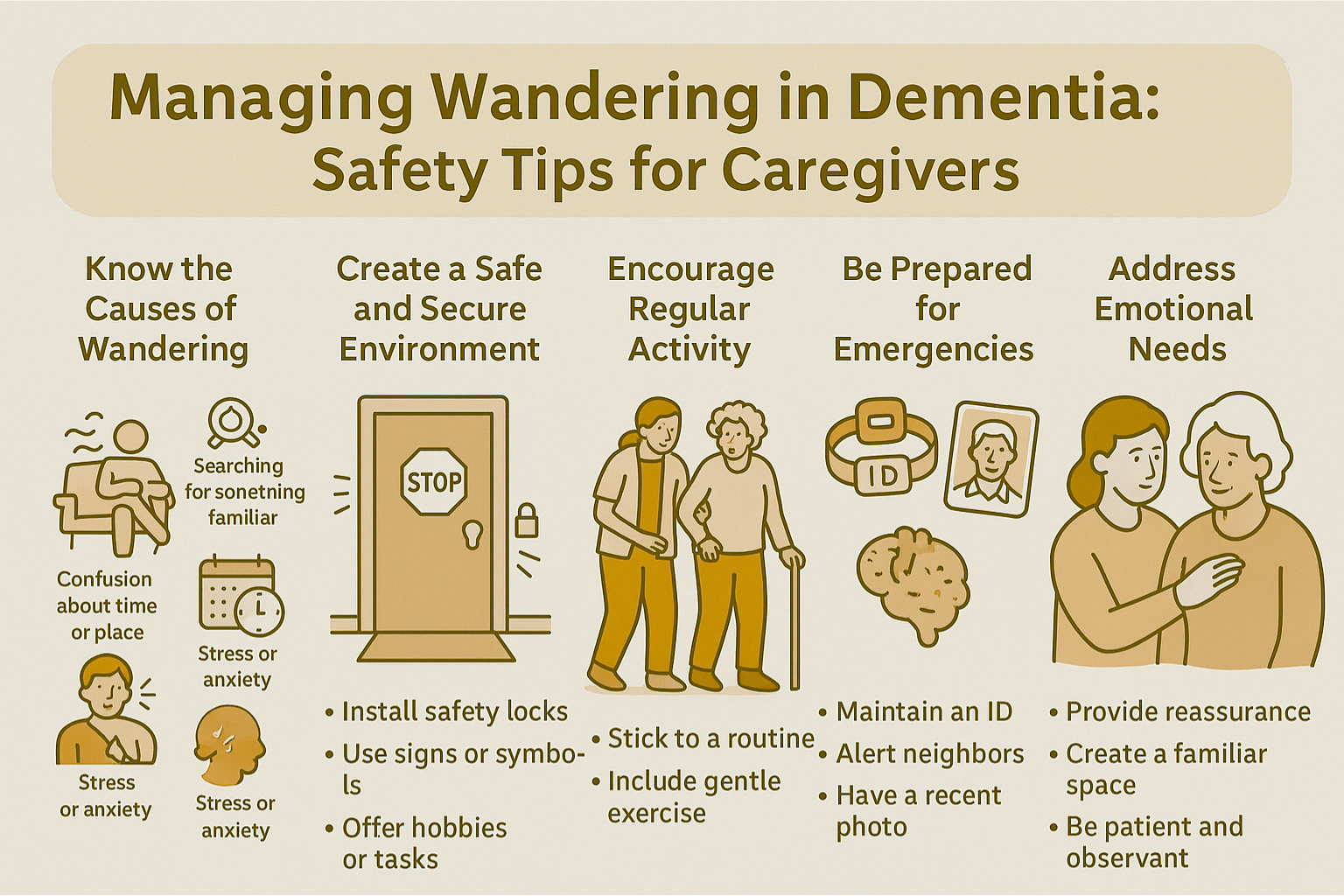
Table of Content
Wandering is a common symptom in individuals living with dementia and can pose significant risks if not managed effectively. It’s essential for caregivers to understand the reasons behind wandering and implement strategies to ensure safety while providing their senior loved ones with a sense of freedom. Here’s how you can handle wandering and create a secure environment for your loved one.
Know the Causes of Wandering
Before addressing wandering, it’s important to understand why it happens. Dementia affects memory and cognitive abilities, leading individuals to feel confused or disoriented. Common triggers for wandering include:
- Boredom – A lack of stimulation can cause restlessness and a need to move.
- Searching for something familiar – Your loved one might be looking for a person, a location, or an object that holds significance for him or her.
- Confusion about time or place – Your loved one might believe he or she needs to go to work or return to a previous home.
- Stress or anxiety – Being in an unfamiliar environment or feeling overwhelmed can cause wandering.
By identifying the underlying reason, caregivers can better tailor their approach to managing wandering behavior.
Caring for a senior with dementia can be challenging for family members. Families looking for top-rated Green Valley home care service providers can reach out to Embrace In-Home Care. From respite care to specialized Alzheimer’s, dementia, stroke, and Parkinson’s care, there are many ways we can make life easier for seniors and their loved ones.
Create a Safe and Secure Environment
Preventing accidents and ensuring safety should be a top priority. Adopting preventive measures at home can minimize the risks associated with wandering.
- Install safety locks – Consider placing locks high or low on doors where they may not be immediately visible.
- Use signs or symbols – Clear signs, such as stop signs on doors or pictures of your loved one’s room, can reduce confusion.
- Consider security systems – Motion detectors, door alarms, or GPS devices can alert you if your loved one attempts to leave the house.
- Limit access to dangerous areas – Secure staircases, swimming pools, and other hazardous areas.
Small changes to the environment can make a big difference in reducing the dangers of wandering.
If you’re concerned about the possibility of your loved one wandering, consider hiring a professional caregiver to keep him or her safe. Caring for senior loved ones can be challenging for families who don’t have expertise or professional training in home care, but this challenge doesn’t have to be faced alone. Family caregivers can turn to Embrace In-Home Care for the help they need. We provide high-quality elderly home care as well as comprehensive Alzheimer’s, dementia, stroke, and Parkinson’s care.
Encourage Regular Activity
Staying active can reduce restlessness, which often leads to wandering. Physical and mental stimulation can also boost overall wellbeing.
- Stick to a routine – Having a consistent daily schedule can provide structure and reduce confusion.
- Include gentle exercise – Activities like walking around the garden or attending a fitness class for seniors can burn excess energy.
- Offer hobbies or tasks – Giving your loved one something purposeful to do, such as folding laundry or gardening, can keep his or her mind engaged.
Promoting these activities ensures your loved one feels a sense of accomplishment, thereby reducing the urge to wander.
Be Prepared for Emergencies
Even with preventive measures, wandering might still occur. Having an action plan can help you respond quickly in case of emergencies.
- Maintain an updated ID – Ensure your loved one always wears identification, such as a bracelet, with his or her name, address, and emergency contact details.
- Alert neighbors and community members – Inform those nearby of your loved one’s condition so they can assist if needed.
- Have a recent photo – Keep a current photo of your loved one to share with authorities in the event he or she wanders.
- Know frequent destinations – Identify places your loved one might attempt to go, like a childhood home or a former workplace.
Preparation is key to ensuring that if your loved one does wander, he or she is found quickly and returned safely.
Address Emotional Needs
Meeting emotional needs can alleviate the feelings of confusion or anxiety that lead to wandering.
- Provide reassurance – Speak in a calm and comforting tone to ease feelings of distress or agitation.
- Create a familiar space – Surround your loved one with familiar objects, photos, or scents that evoke positive memories.
- Be patient and observant – Watch for signs of anxiety or confusion to address them before they escalate.
By addressing emotional triggers, you can create a more soothing environment that curbs the tendency to wander.
Even when families have the best intentions, caring for a senior loved one with dementia can be challenging. Fortunately, Embrace In-Home Care is here to help. We are a leading provider of dementia care. Green Valley families can take advantage of our flexible and customizable care plans, and our caregivers always stay up to date on the latest developments in senior care. Reach out to one of our compassionate Care Managers today.
